BMW i4 VS Toyota Mirai
BMW i4
The BMW i4 beautifully merges the dynamism of a saloon with the efficiency of an electric vehicle, offering a truly exhilarating driving experience. Its design seamlessly blends elegance and athleticism, highlighting BMW's dedication to both aesthetics and performance. Inside, the i4 boasts a high-tech cockpit that harmonises luxury with intuitive technology, allowing drivers to stay connected while on the move.
more informationToyota Mirai
The Toyota Mirai represents a groundbreaking step in hydrogen fuel cell technology, offering an eco-friendly alternative to traditional petrol engines. Its sleek design and futuristic aesthetic make it a standout on the road, while the interior combines comfort with cutting-edge features. With its impressive range and quick refuelling capabilities, the Mirai is paving the way for the future of sustainable motoring.
more information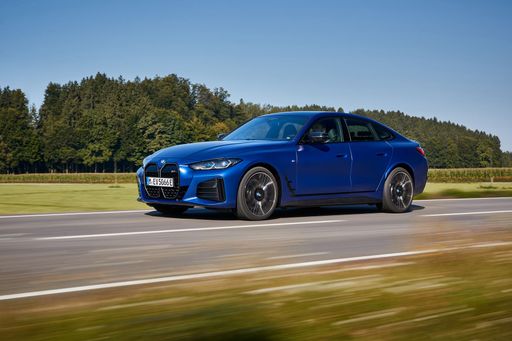 @ press.bmwgroup.com
@ press.bmwgroup.com
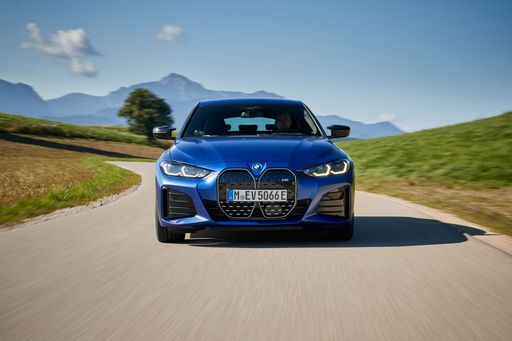 @ press.bmwgroup.com
@ press.bmwgroup.com
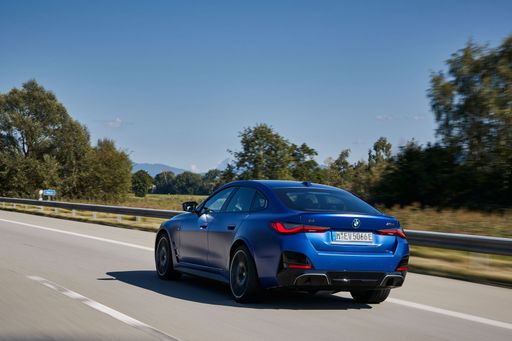 @ press.bmwgroup.com
@ press.bmwgroup.com
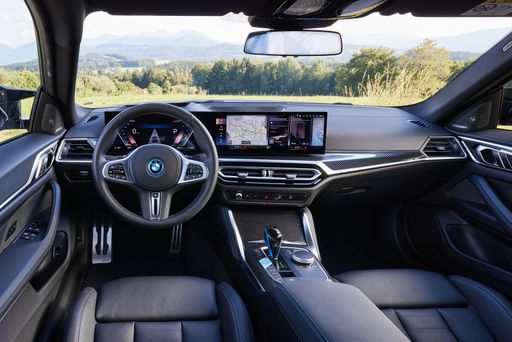 @ press.bmwgroup.com
@ press.bmwgroup.com
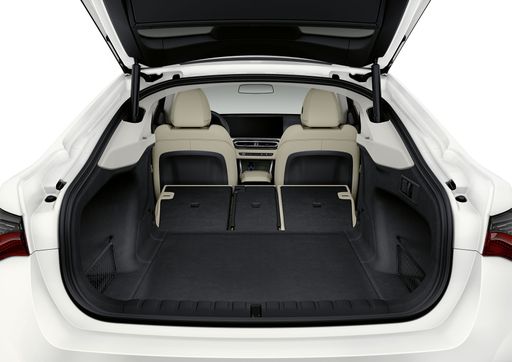 @ press.bmwgroup.com
@ press.bmwgroup.com
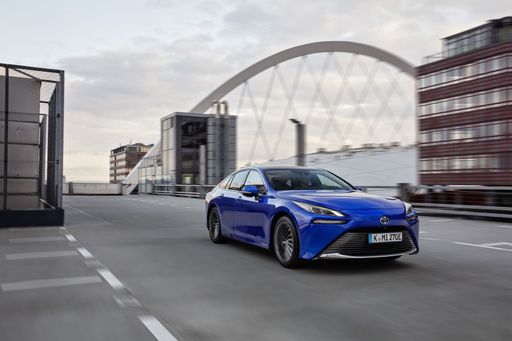 @ Toyota
@ Toyota
Costs and Consumption |
|
|---|---|
|
Price
about 49300 - 61800
£
|
Price
-
|
|
Consumption L/100km
-
|
Consumption L/100km
-
|
|
Consumption kWh/100km
15.6 - 18
kWh
|
Consumption kWh/100km
-
|
|
Electric Range
485 - 582
km
|
Electric Range
-
|
|
Battery Capacity
67.1 - 81.3
kWh
|
Battery Capacity
-
|
|
co2
0
g/km
|
co2
-
|
|
Fuel tank capacity
-
|
Fuel tank capacity
-
|
Dimensions and Body |
|
|
Body Type
Hatchback
|
Body Type
-
|
|
Seats
5
|
Seats
-
|
|
Doors
5
|
Doors
-
|
|
Curb weight
2075 - 2290
kg
|
Curb weight
-
|
|
Trunk capacity
470
L
|
Trunk capacity
-
|
|
Length
4783
mm
|
Length
-
|
|
Width
1852
mm
|
Width
-
|
|
Height
1448
mm
|
Height
-
|
|
Payload
445 - 480
kg
|
Payload
-
|
Engine and Performance |
|
|
Engine Type
Electric
|
Engine Type
-
|
|
Transmission
Automatic
|
Transmission
-
|
|
Transmission Detail
Reduction Gearbox
|
Transmission Detail
-
|
|
Drive Type
Rear-Wheel Drive, All-Wheel Drive
|
Drive Type
-
|
|
Power HP
286 - 544
HP
|
Power HP
-
|
|
Acceleration 0-100km/h
3.9 - 6
s
|
Acceleration 0-100km/h
-
|
|
Max Speed
190 - 225
km/h
|
Max Speed
-
|
|
Torque
400 - 795
Nm
|
Torque
-
|
|
Number of Cylinders
-
|
Number of Cylinders
-
|
|
Power kW
210 - 400
kW
|
Power kW
-
|
|
Engine capacity
-
|
Engine capacity
-
|
|
Top speed
190 - 225
km/h
|
Top speed
-
|
General |
|
|
Model Year
2024
|
Model Year
-
|
|
CO2 Efficiency Class
A
|
CO2 Efficiency Class
-
|
|
Brand
BMW
|
Brand
-
|
BMW i4
Exploring the Future: The BMW i4
In the ever-evolving landscape of electric vehicles, BMW has stepped forward with its state-of-the-art BMW i4. This model combines luxury, performance, and sustainability, reflecting the brand's commitment to innovation and excellence. Let's dive into the technical details and the innovative features that make the BMW i4 a noteworthy entry in the electric vehicle market.
Power and Performance Unleashed
Under the sleek bonnet of the BMW i4 lies a powerful electric motor, offering a range of performance options from 286 to an exhilarating 544 PS. With a 0 to 100 km/h acceleration time spanning between 3.9 and 6 seconds, the i4 provides a driving experience that matches its sporty exterior. The advanced powertrains offered include rear-wheel drive as well as all-wheel drive options, catering to different driving preferences.
Energy Efficiency Meets Long Range
The BMW i4 stands out not only for its performance but also for its impressive efficiency and range. The electric vehicle boasts a consumption rate ranging from 15.6 to 18 kWh per 100 km, complemented by an electrical range between 485 and 582 km. Such figures are achieved through BMW's innovative engineering and the generous 67.1 to 81.3 kWh battery capacity.
Innovation and Technology at the Core
BMW has infused advanced technology throughout the i4 to enhance both comfort and connectivity. The vehicle features state-of-the-art integration with the BMW iDrive system, providing seamless control and access to driving data, entertainment, and navigation. Furthermore, the i4 is fitted with cutting-edge driver assistance features, making every journey safer and more enjoyable.
Design and Functionality: The Perfect Balance
The aesthetically pleasing design of the BMW i4 is equally matched by its functional interior. With a 470-litre boot and the ability to comfortably seat up to five passengers, the vehicle balances practicality with style. The streamlined body measuring 4783 mm in length, 1852 mm in width, and 1448 mm in height, ensures that head-turning aesthetics are accompanied by aerodynamic efficiency.
Sustainability in Motion
Beyond performance and elegance, the BMW i4 is a testament to the brand's commitment to sustainability. As a zero-emission vehicle with a CO2 output of 0 g/km, it aligns with the global shift towards environmentally friendly transportation solutions. Furthermore, its efficient energy consumption underscores its effectiveness as a leader in electric vehicle innovation.
Conclusion: The BMW i4 – A Visionary Road Ahead
The BMW i4 is more than just an electric car; it is a sophisticated blend of cutting-edge technology, impressive range, and unparalleled performance. With its CO2 efficiency class rating of A and top-tier driving dynamics, the i4 is set to redefine the standards for electric vehicles in the luxury segment. Whether for a daily commute or a longer journey, the BMW i4 promises an exceptional driving experience while paving the way for a sustainable future.
Toyota Mirai
The Future of Driving: Introducing the Toyota Mirai
The Toyota Mirai represents a significant leap forward in automotive innovation, being one of the leading vehicles in the hydrogen fuel cell market. As we continue to search for sustainable transportation solutions, the Mirai stands out with its pioneering technology and exceptional driving features.
Revolutionary Hydrogen Fuel Cell Technology
At the heart of the Toyota Mirai is its groundbreaking hydrogen fuel cell system. Unlike conventional internal combustion engines, the Mirai uses a fuel cell stack to generate electricity through the chemical reaction between hydrogen and oxygen. This process not only powers the car with zero emissions—producing only water vapour as a byproduct—but also delivers a smooth and silent drive.
Technical Specifications and Performance
The Toyota Mirai is designed with performance in mind. It boasts a power output of 182 PS (134 kW) and delivers a robust 300 Nm of torque, allowing it to accelerate from 0 to 100 km/h in just 9.2 seconds. While its top speed is a respectable 175 km/h, it's the Mirai's impressive range that really stands out. The vehicle can travel up to 650 km on a single hydrogen fill-up, making it a practical choice for long-distance travel.
Sophisticated Design and Comfort
Designed as a saloon, the Toyota Mirai combines aesthetic appeal with comfort. Its dimensions—4975 mm in length, 1885 mm in width, and 1470 mm in height—provide a spacious interior for five passengers. The design is sleek and modern, reflecting its advanced engineering. The boot offers 300 litres of storage, suitable for everyday needs.
Advanced Features and Safety
The Toyota Mirai doesn't just excel in propulsion technology; it also includes a range of advanced features to enhance driver comfort and safety. Available in three trims—Advanced, Executive, and Luxury—the Mirai includes state-of-the-art safety systems and infotainment options to ensure a connected and secure driving experience.
Cost and Efficiency
While the price of the Toyota Mirai ranges from €65,990 to €76,290, its monthly running costs—estimated between €1,496 and €1,672—and per kilometre costs of 59.9 to 66.9 cents, reflect the efficient nature of hydrogen-powered vehicles. Considering its innovative technology, the Toyota Mirai offers excellent value for those looking to invest in the future of eco-friendly transport.
The Toyota Mirai: Driving Towards a Sustainable Future
Overall, the Toyota Mirai is more than just a car; it's a vision for the future of sustainable transportation. With its cutting-edge hydrogen fuel cell technology, impressive range, and commitment to zero-emissions driving, the Mirai sets a new standard in environmentally conscious car design. Whether you're an eco-enthusiast or just someone seeking a reliable and technological advanced vehicle, the Toyota Mirai is worth considering.
